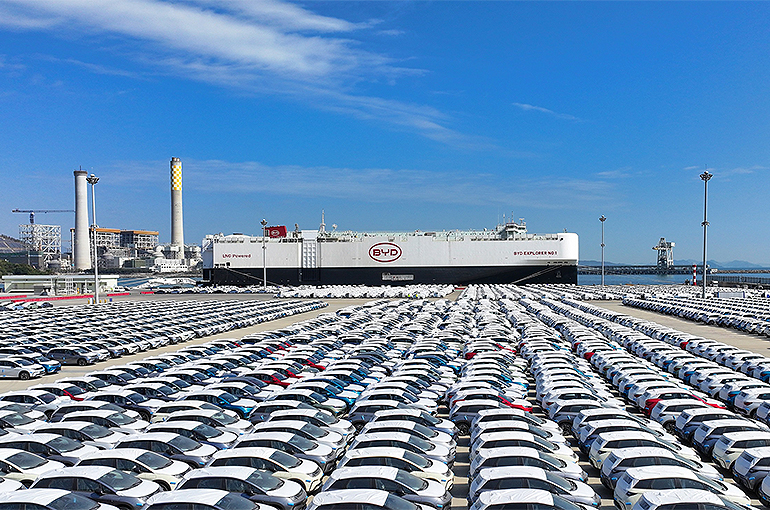 BYD’s First Ro-Ro Ship Sets Sail on Maiden Voyage to South America
BYD’s First Ro-Ro Ship Sets Sail on Maiden Voyage to South America(Yicai) May 7 -- The first roll-on/roll-off ship of Chinese new energy vehicle giant BYD has embarked on its first voyage, bound for South America with almost 3,440 NEVs onboard.
BYD Pioneer 1 departed from the Xiaomo International Logistics Port in China’s southern Guangdong province at the start of the Labor Day holiday, and is headed to Suape in Brazil, Yicai learned at the departure ceremony.
Shenzhen-based BYD invested USD500 million in 2022 to build eight car-carrying ro-ro vessels in response to rising shipping costs and increasing demand from overseas markets.
Car-carrying ro-ro vessels from China mainly export vehicles to Southeast Asia, Europe, and America. Brazil, the world’s sixth-largest auto market, is one of the most important export destinations for Chinese electric vehicles.
Brazil’s EV sales grew for the sixth consecutive year last year, reaching to 93,900 units. BYD and other Chinese carmakers, such as Great Wall Motor and Chery Automobile, have already entered the Brazilian market, with BYD planning to hike its investment in the Brazilian state of Bahia.
Chery, GAC Group, and SAIC Motor have also been actively exploring ro-ro shipping services to expand in American markets, particularly Brazil and Mexico.
Chery, in collaboration with its unit Wuhu Shipyard, set up a car carrier construction base in Weihai and purchased three ro-ro ships early last year. GAC Business partnered with China Merchants Energy Shipping to form China Merchants Roro. SAIC Anji Logistics has already nine dedicated foreign trade vessels operated through self-owned and self-operated models.
Mexico is an important market for Chinese carmakers because it is a great starting point to enter North America. Last year, they sold about 129,300 vehicles in Mexico for a market share of 20 percent. BYD, Jianghuai Automobile Group, and Geely Automobile Holdings were among the those performing well in the Mexican market.
Exports to Mexico is not the only option for Chinese automakers. In fact, many of them, including BYD, Neta, and Jetour, plan to build factories in the country to better reach the US market.
Expanding in the US is not easy for Chinese car firms because of factors such as complex politics and industry development. And accessing the market is even more difficult now in the wake of the US Inflation Reduction Act, which puts limits on vehicles that use battery components made in China.
Editor: Futura Costaglione